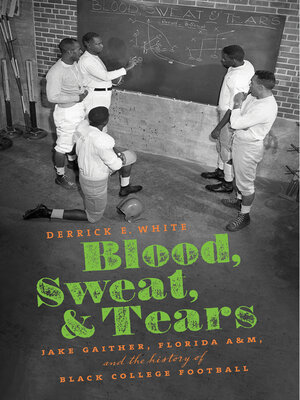Blood, Sweat, and Tears
ebook ∣ Jake Gaither, Florida A&M, and the History of Black College Football
By Derrick E. White

Sign up to save your library
With an OverDrive account, you can save your favorite libraries for at-a-glance information about availability. Find out more about OverDrive accounts.
Find this title in Libby, the library reading app by OverDrive.



Search for a digital library with this title
Title found at these libraries:
| Library Name | Distance |
|---|---|
| Loading... |
Black college football began during the nadir of African American life after the Civil War. The first game occurred in 1892, a little less than four years before the Supreme Court ruled segregation legal in Plessy v. Ferguson. In spite of Jim Crow segregation, Black colleges produced some of the best football programs in the country. They mentored young men who became teachers, preachers, lawyers, and doctors — not to mention many other professions — and transformed Black communities. But when higher education was integrated, the programs faced existential challenges as predominately white institutions steadily set about recruiting their student athletes and hiring their coaches. Blood, Sweat, and Tears explores the legacy of Black college football, with Florida A&M’s Jake Gaither as its central character, one of the most successful coaches in its history. A paradoxical figure, Gaither led one of the most respected Black college football programs, yet many questioned his loyalties during the height of the civil rights movement.
Among the first broad-based histories of Black college athletics, Derrick E. White’s sweeping story complicates the heroic narrative of integration and grapples with the complexities and contradictions of one of the most important sources of Black pride in the twentieth century.
Among the first broad-based histories of Black college athletics, Derrick E. White’s sweeping story complicates the heroic narrative of integration and grapples with the complexities and contradictions of one of the most important sources of Black pride in the twentieth century.







